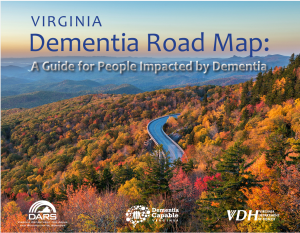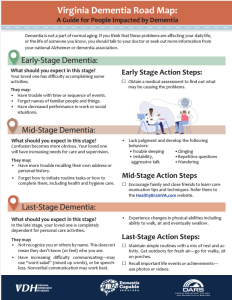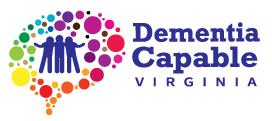 Virginia Dementia Road Map: A Guide for People Impacted by Dementia | Many families say they don't know what to do when someone has dementia. They wish they had a guide to help them through it. This document is supposed to be that guide. It helps you see what might happen next and gives you advice on what choices you might need to make and what to do next.
Virginia Dementia Road Map: A Guide for People Impacted by Dementia | Many families say they don't know what to do when someone has dementia. They wish they had a guide to help them through it. This document is supposed to be that guide. It helps you see what might happen next and gives you advice on what choices you might need to make and what to do next.
![]() Alzheimer’s and Related Dementia Interactive Glossary |When you're learning about Alzheimer's disease and caregiving, you might find some words you don't know. The Alzheimer's Association made this glossary to help you understand these words about care and Alzheimer's.
Alzheimer’s and Related Dementia Interactive Glossary |When you're learning about Alzheimer's disease and caregiving, you might find some words you don't know. The Alzheimer's Association made this glossary to help you understand these words about care and Alzheimer's.
 Virginia Dementia Road Map Flyer| Many families feel unsure about how to handle life when someone has dementia. This one-page document is made to be a short guide. It shows you the main things to think about and what to do next. It tells you what might happen, what choices you might need to make, and what you can do to help.
Virginia Dementia Road Map Flyer| Many families feel unsure about how to handle life when someone has dementia. This one-page document is made to be a short guide. It shows you the main things to think about and what to do next. It tells you what might happen, what choices you might need to make, and what you can do to help.
Caregiver Toolkit | This Caregiver Toolkit was made from the Virginia Dementia Road Map: A Guide for people impacted by Dementia. It has tools and resources to help you care for your loved one. It tells you important things to think about and what to do next. It explains what might happen, what choices you might need to make, and how you can help.
 Memory Assessment Centers | Memory care assessment centers provide comprehensive evaluations to assess cognitive functions and identify specific needs for individuals experiencing memory impairment. These centers offer personalized care plans tailored to support patients and their families through the challenges of memory-related conditions.
Memory Assessment Centers | Memory care assessment centers provide comprehensive evaluations to assess cognitive functions and identify specific needs for individuals experiencing memory impairment. These centers offer personalized care plans tailored to support patients and their families through the challenges of memory-related conditions.
The Virginia Memory Project is a survey for all adults in Virginia about brain health, memory and caregiving. It is the first expansive web-based brain health registry in the Commonwealth. Your answers will help policymakers and public health workers prioritize resources for people with memory loss and caregivers in Virginia.
*Note all responses are kept anonymous.
Virginia Area Agency on Aging Directory | Contact your local Area Agency on Aging (AAA) for more information on resources available in your community.
Tips for Living Alone with Early State Dementia | Lots of people with early-stage dementia can still do their everyday activities. But it’s good to think about when these tasks might become trickier. The earlier you start using new ways to help you deal with changes, the more time you'll have to get used to them.
Chronic Disease Self-Management Education | Led by trained Peer Leaders from the Self-Management Resource Center, this workshop helps people learn how to deal with symptoms and medicines, talk with family and doctors, handle tough feelings, relax, eat healthy, exercise, and set goals each week to get healthier and live better.

